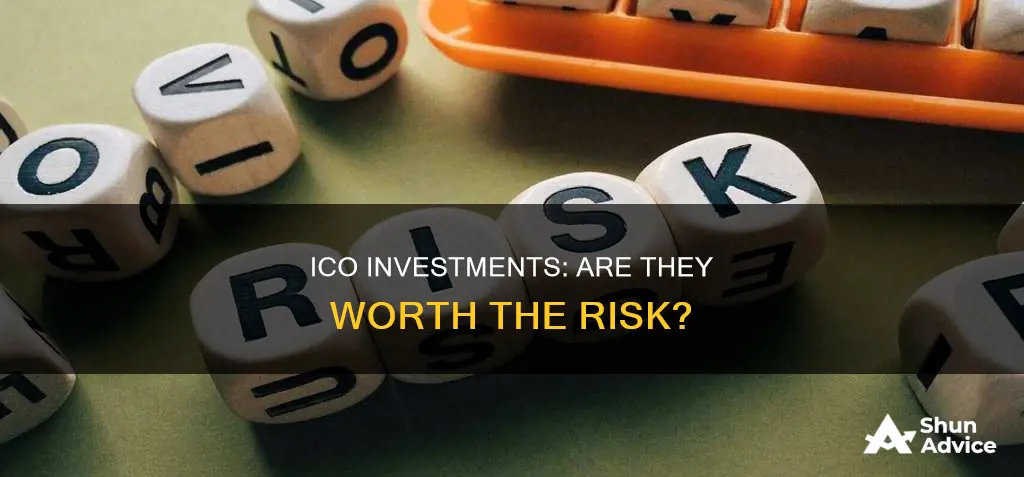
An initial coin offering (ICO) is a fundraising method for new cryptocurrency projects. It is often compared to an initial public offering (IPO) in the stock market, but there are some crucial differences.
ICOs are a way for startups to raise capital through an alternative to traditional financing methods. They are a form of crowdfunding, although a private ICO that does not seek public investment is also possible.
In an ICO, a quantity of cryptocurrency is sold in the form of tokens to speculators or investors, in exchange for legal tender or other cryptocurrencies such as Bitcoin or Ether. The tokens are promoted as future functional units of currency if or when the ICO's funding goal is met and the project successfully launches.
ICOs can be a source of capital for startup companies, allowing them to avoid regulations that prevent them from seeking investment directly from the public, and intermediaries such as venture capitalists, banks, and stock exchanges.
However, ICOs are largely unregulated and carry high risk. Due to the lack of regulation and enforcement of securities law, ICOs have been the vehicle for scams and fraud.
Despite the risks, ICOs can present prospects for high returns and are a completely new phenomenon in the world of finance and technology.
| Characteristics | Values | |
|---|---|---|
| --- | --- | --- |
| Definition | A type of funding using cryptocurrencies, often a form of crowdfunding | |
| Comparison | Similar to an initial public offering (IPO) | |
| Purpose | A way for startups to raise capital through an alternative to traditional financing methods | |
| Advantages | High potential profits, accessible to anyone, fast and efficient | |
| Disadvantages | High risk, lack of regulation, scams, poor liquidity, and volatility | |
| Tokens | Currency tokens, security tokens, utility tokens | |
| Regulation | Largely unregulated, but may be subject to securities law | |
| Examples | Ethereum, Cardano, Tezos, Dragon Coins |
What You'll Learn
- ICOs are a risky investment due to fraud, lack of regulation, and high failure rates
- ICOs are a form of crowdfunding, but private ICOs don't seek public investment
- ICOs can be structured in different ways, such as a fixed number of tokens with a variable price
- ICOs are largely unregulated, but they may fall under securities laws
- Due diligence is critical when assessing ICOs, and advisors must conduct extensive research

ICOs are a risky investment due to fraud, lack of regulation, and high failure rates
Initial coin offerings (ICOs) are a risky investment due to fraud, lack of regulation, and high failure rates.
ICOs are a popular way to raise funds for products and services, particularly those related to cryptocurrency. They are similar to initial public offerings (IPOs) in that they are a way for companies to raise capital by offering investors the opportunity to buy into a new cryptocurrency issued by the company. However, unlike IPOs, ICOs are largely unregulated and operate in a legal grey area. This lack of regulation means that ICOs are susceptible to fraud and manipulation, with many ICOs turning out to be scams that separate investors from their money with promises of guaranteed returns.
ICOs are also risky because of their high failure rates. Even legitimate ICOs have high failure rates, and the speculative nature of ICO investments means that they tend to be extremely volatile. The principal invested can decline significantly or go to zero after a startup failure. Studies have found that most ICOs lose most or all their value over time, and there is a high likelihood of investors selecting poor projects due to information asymmetries.
To avoid falling victim to fraud and to minimise the risk of investing in a failed ICO, investors should conduct thorough due diligence. This includes researching the individual team members of a project, reviewing the whitepaper, and checking that the ICO is registered with the relevant authorities. Investors should also be cautious of projects that guarantee returns, sound too good to be true, or pressure investors to act quickly.
Bitcoin: Dumb Investment or Smart Bet?
You may want to see also

ICOs are a form of crowdfunding, but private ICOs don't seek public investment
Initial Coin Offerings (ICOs) are a form of crowdfunding, allowing businesses to raise capital through the creation and sale of a digital token to fund project development.
ICOs are similar to Initial Public Offerings (IPOs) in the stock market, but with key differences. IPOs are subject to strict regulations, requiring companies to file a registration statement and provide financial statements and potential risk factors. In contrast, ICOs are largely unregulated, and while they may need to be registered as security offerings, they often operate in a regulatory grey area.
ICOs are also accessible to anyone, whereas IPOs may have restrictions on who can invest. They are a fast and efficient way for startups to raise funds, but they carry high risk due to the lack of regulation, making it easier for scammers to take advantage of less cautious investors.
Private ICOs, like any ICO, do not require public investment, but they can still seek private investment.
IRA Bitcoin Investment: Is It Possible?
You may want to see also

ICOs can be structured in different ways, such as a fixed number of tokens with a variable price
Another type of ICO structure is a static supply and static price. Here, the ICO has a set funding goal or limit, meaning each token sold has a preset price, and the total token supply is fixed.
A third type of ICO structure is a dynamic supply and static price. This is where the ICO has a dynamic token supply but a static price. The amount of funding received determines the supply of tokens.
ICOs are often compared to initial public offerings (IPOs). However, ICOs are largely unregulated and carry high risk. They are also susceptible to scams and fraud due to the lack of mandatory disclosures, regulations, and standardisation.
Litecoin Investment Safety: Is It a Secure Bet?
You may want to see also

ICOs are largely unregulated, but they may fall under securities laws
Initial Coin Offerings (ICOs) are largely unregulated, but they may fall under securities laws. This means that while ICOs are not subject to the same strict rules as traditional Initial Public Offerings (IPOs), they may still be subject to regulation by the U.S. Securities and Exchange Commission (SEC) or other regulatory bodies.
In the United States, a federal judge ruled that ICOs may be considered securities offerings and thus fall under the jurisdiction of the SEC. This ruling gives the SEC crucial authority to regulate the ICO space, which has seen billions of dollars in cryptocurrency offerings. Prior to this ruling, the question of whether ICOs were subject to securities laws was a difficult one to answer.
ICOs are a relatively new phenomenon and, as such, the regulatory landscape is still evolving. In the early days of ICOs, there was little to no regulation, which created a "wild west" environment with a high risk of fraud and manipulation. However, as ICOs have gained popularity, regulators have begun to pay closer attention and enforce regulations where applicable.
The SEC has taken an active role in regulating ICOs, with a focus on protecting investors. The SEC has brought several enforcement actions against ICOs that were deemed to be fraudulent or in violation of securities laws. In addition, the SEC has issued guidance and warnings to investors about the risks associated with ICOs.
Other countries and regions, such as the UK, Singapore, and China, have also taken steps to regulate ICOs. In some cases, this has involved issuing consumer warnings about the risks of investing in ICOs, while in other cases, it has involved implementing specific regulations or even banning ICOs altogether.
The regulatory landscape for ICOs is complex and evolving, and it varies by jurisdiction. As such, it is important for individuals and businesses involved in ICOs to carefully consider the legal and regulatory implications and seek appropriate advice.
Who's Buying Bitcoin? Institutional Investment Firm Roundup
You may want to see also

Due diligence is critical when assessing ICOs, and advisors must conduct extensive research
Advisors should warn clients of potential red flags, such as statements guaranteeing high returns, fake founder credentials, plagiarised whitepapers, or pressure to invest quickly. Advisors must also conduct thorough technical and financial analysis to support any recommendation to participate in an ICO.
There are several crucial elements that advisors should evaluate when conducting due diligence on an ICO:
- Founder credentials and track record
- Proposed product or service viability and competition
- Token utility and use cases
- Code audits and cybersecurity
- Token valuation and sale structure
- Planned use of proceeds
- Market conditions and growth projections
Advisors should also interrogate assumptions and assess alignment with client goals before endorsing any ICO investment.
A Beginner's Guide: Investing Bitcoin in the UAE
You may want to see also
Frequently asked questions
An ICO, or Initial Coin Offering, is a type of fundraising activity in the blockchain and cryptocurrency space. It is similar to an IPO, or Initial Public Offering, in the stock market.
Companies that decide to have an ICO announce the date, rules, and buying process in advance. On the date of the ICO, investors can buy the new cryptocurrency. The number of tokens sold and the token price can be either fixed or variable.
At the most basic level, starting your own ICO involves creating a cryptocurrency token, setting a date, and making rules for the token sale. However, to successfully raise funds, you'll need a dedicated team, a whitepaper outlining your project, a roadmap with short- and long-term goals, market research on other ICOs, a social media presence, and a marketing campaign.
ICOs are largely unregulated. In the US, there are no regulations that apply specifically to ICOs. However, if an ICO fits the classification of a securities offering, then it falls under the SEC's jurisdiction and is regulated by federal securities laws. Some countries have banned ICOs entirely, including China, Nepal, Bangladesh, Macedonia, Bolivia, and Ecuador.
ICOs offer high potential profits, accessibility to anyone, and a fast and efficient way for startups to raise funds. However, there is a significant risk that the token loses value or fails entirely, there is a lack of regulation resulting in more scams and mediocre projects, and it usually takes some knowledge of crypto wallets to invest in ICOs.







